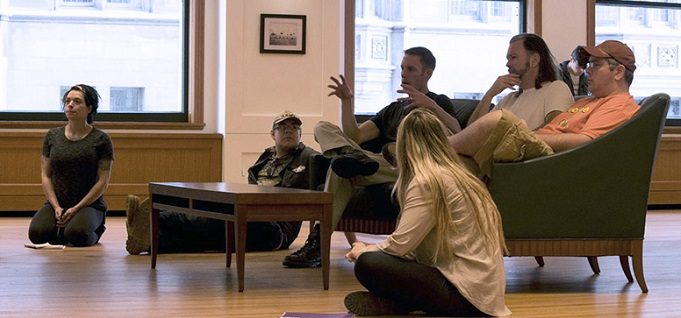From soldier to civilian
By Donna Bieschke
March 7, 2018
At an Illinois community college, a class helps military veterans navigate the transition to civilians.
For some veterans of war, the enemy may be thousands of miles away or it could be as close as his or her mind.
When soldiers started coming home from Iraq and Afghanistan several years ago, many returned to school to continue their college education. At McHenry County College (Illinois), U.S. history instructor Todd Culp often heard stories from vets who were struggling to make the transition from soldier to civilian. So, two years ago, he proposed “The Journey Home” class to help soldiers navigate that transition.
“A lot of soldiers would talk to me after class about their struggles and re-adapting to civilian life and college,” Culp said. “I started realizing there’s a need out there [for a specialized class].”
Culp said he understands what the veterans are going through, because his own research has taken him into conflict zones in the Middle East and Southeast Asia.
“I spent 15 years with soldiers in my office, struggling with PTSD. They heard I have PTSD from my experience in the Middle East,” Culp said. “What began as a more personal relationship has expanded into something fascinating for me as an instructor — history from the perspective of the soldier and role of soldier in a democracy.”
Developing expertise
Culp studied terrorism for 24 years and has background as a terrorism specialist and wrote his master’s degree thesis and doctoral thesis on Islam terrorist groups. His first trip to the Middle East was in his early 20s.
“I tried to understand why the violence was going on over there. I wanted to see for myself — growing up in a blue collar town — we learned by talking to people. So, I went into the middle of a revolution and started asking questions,” he said.
Culp completed his Ph.D. dissertation right after 9/11 on the politics of Islam terrorist groups of Southeast Asia and the Middle East. His research caught the eyes of governmental officials and large research universities throughout the U.S.
“Suddenly, all of my research was a hot topic and relevant to a lot of people,” he said.
Culp and his colleague, English instructor Mark Waters, applied for and received a nearly $100,000 grant from the National Endowment for Humanities (NEH) in 2016 to develop “The Journey Home” class, a dual-course series that combines two disciplines — history and literature, which received praise from both U.S. Sen. Dick Durbin (D-Illinois) and U.S. Rep. Randy Hultgren (R-Illinois).
The first Journey Home class in fall 2016 combined American history and American literature, and the second class in fall 2017 featured Western civilization and world literature.
“The grant is just a start. I want to continue the program as long as we can,” Culp said.
Now entering the third year of the grant, Culp and Waters will present at upcoming conferences what they learned and share how to communicate with veterans. One thing they both agree on after teaching two semesters of the course is that the class means different things to different people.
“The vets and non-veterans respond differently, and the vets who saw combat have a different set of experiences than the noncombat vets,” Waters said.
Culp agreed, saying that from age zero though 18, kids are taught that killing is a crime, but in boot camp, recruits are taught that killing is the goal.
“The country is quick to send people to war, but slow on remembering them when they come back and help them adjust,” Culp said. “We make it a partisan issue when it’s actually a human issue.”
To facilitate the healing process, the students do a large amount of writing and discussing in class.
“The class opens wounds so they heal,” Waters said. “They need to process [their thoughts] in order for healing to take place. Some classes are uncomfortable or even chaotic,” he added.
There’s more to the story. Read the full article in CC Daily.



